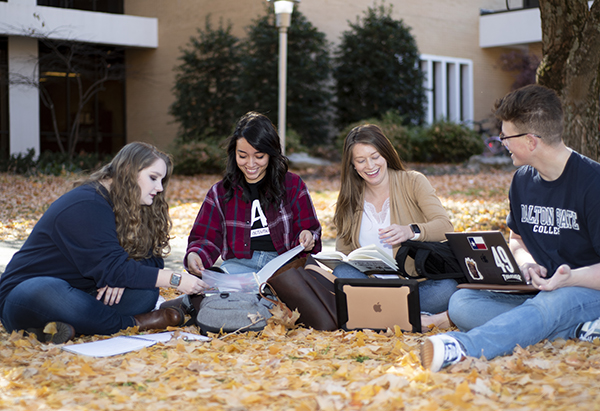News
Dalton State Ranked Nationally for Contribution to ‘Public Good’
09/14/20
 Note: This file photo was taken before the pandemic.
Note: This file photo was taken before the pandemic.
Not only does Dalton State provide students a quality education at a great value, but it prepares students for success and civic engagement after graduation. Those qualities and more earned the college recognition on Washington Monthly’s annual College Guide and Rankings.
Dalton State ranked No. 51 nationally among 248 “Bachelor’s Colleges” and was listed among 157 institutions across the nation as one of “America’s Best Colleges for Student Voting.” The college was also ranked No. 72 for “Best Bang for the Buck” among 278 colleges and universities in the Southeast.
Washington Monthly’s “Bachelor’s Colleges” rankings are based on the college’s contribution to the “public good” in three categories: social mobility, research and providing opportunities for public service.
“We have known for a long time that Dalton State embodies these areas but it is nice to see us recognized nationally for the work we’re doing,” said Dr. Margaret Venable, president of Dalton State. “This ranking is validating because it is based on data and facts as opposed to surveys. We enroll a large number of first-generation students, and we have a low net price, which makes us very affordable. Both factors weighed into these rankings.”
Dalton State’s value and service of first-generation students contributed to the overall ranking. Washington Monthly showed Dalton State is No. 6 nationally for net price and No. 8 nationally for performance of first-generation students.
Most students at Dalton State graduate with little or no student debt. Sixty-two percent graduate without student loans, while more than three-fourths of all our students receive financial aid, said Dr. Jodi Johnson, vice president for Student Affairs and Enrollment Management.
“We deliver a high quality, affordable education,” Johnson said. “We believe students should have access to higher education regardless of their socioeconomic status. A college degree should not be reserved only for the wealthy or privileged. We do all we can here to help students achieve their personal and professional goals, which includes helping students overcome financial hurdles.”
More than half the students at Dalton State are first-generation students.
“Sometimes these students need a little extra help to transition to college, and we provide that,” Venable said. “We are proud of that. We want to contribute to our local workforce and prepare graduates for success, and to do that we must consider the needs of our students.”
Dalton State also ranked highly in service.
“We have a robust service and civic engagement involvement,” Johnson said. “Our students actively volunteer in the community and we create opportunities to increase voter registration across campus. As a result, students are engaged not only in the classroom but in the community. We realize a graduate’s success includes more than skills learned inside the classroom. We want our students to go on to be engaged and involved citizens whether they stay in Northwest Georgia or move elsewhere.”
Listed for “America’s Best Colleges for Student Voting”
Dalton State is routinely recognized by National Study of Learning, Voting, and Engagement (NSLVE) at Tufts University and the ALL IN Campus Democracy Challenge for its voter engagement and voting action planning. Data from those organizations was used to create an “honor roll” of institutions who have an ongoing “commitment to increasing student voting and have been transparent about the results,” according to Washington Monthly.
“We believe that colleges have a special obligation to help young Americans become active political citizens,” states a Washington Monthly article. “It will help if they make sure students can be confident about where they will be on Election Day.”
“Our values challenge us to create a campus culture of service, engagement and collaboration to advance the welfare of Northwest Georgia and beyond,” Johnson said. “The organized effort to increase student voter participation is an organic outcome of living our mission, vision and values.”
